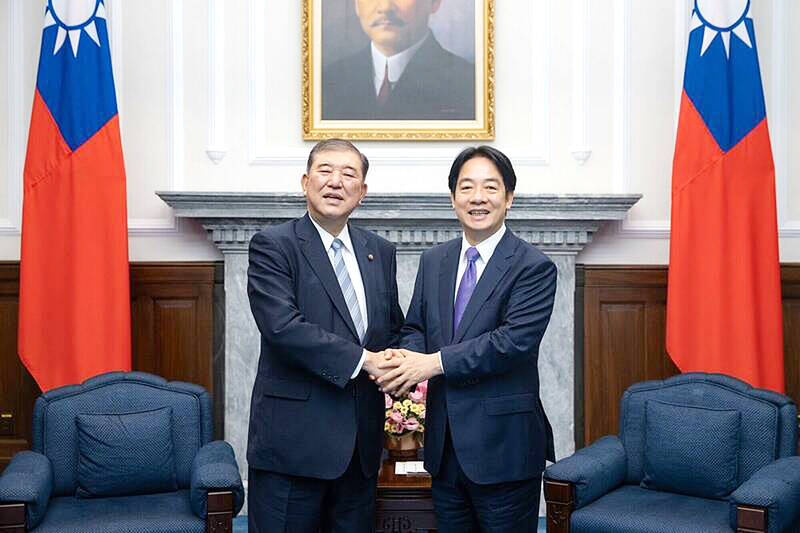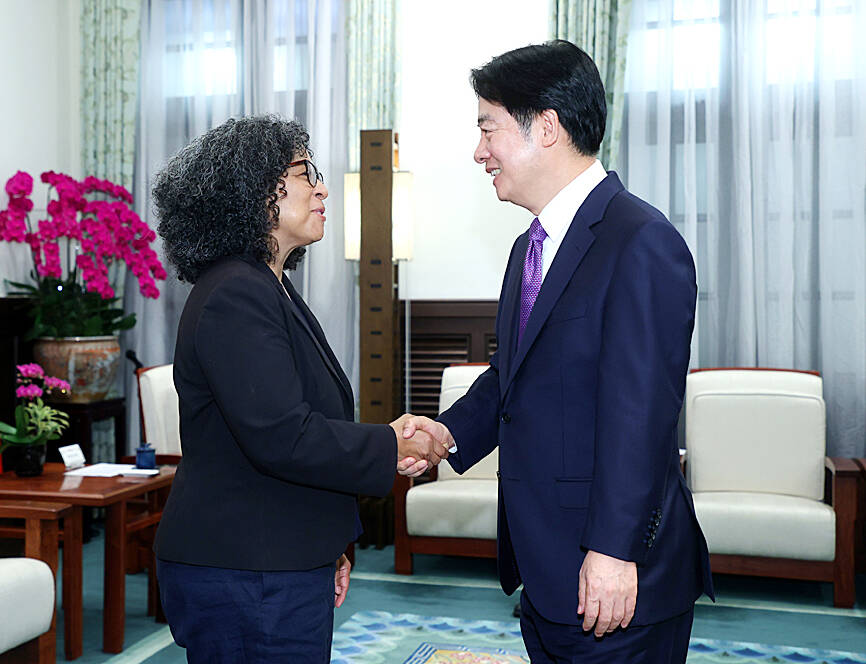President William Lai (賴清德) yesterday reaffirmed his government’s commitment to continue bolstering Taiwan’s defense capabilities through promoting military reforms and increasing spending while meeting with Japanese parliamentarians, and reiterated a similar message in a meeting with US lawmakers on the same day.
Lai made the remarks while hosting a delegation led by Japanese Representative Shigeru Ishiba, adding that Taiwan and Japan should shore up their ties to secure peace and stability in the Indo-Pacific region.
Taiwan and Japan have an abiding friendship that has grown stronger from the shared challenges of earthquakes and the global COVID-19 pandemic, Lai said, adding that the two nations have a brotherly bond.

Photo courtesy of the Presidential Office
Taipei and Tokyo would maintain their partnership to confront more global challenges to come, he said.
Taiwan has the will and determination to protect its national security, and work in partnership with fellow democracies to counter the threat to regional peace posed by China’s rise, Lai said.
Lai outlined his administration’s four pillars of peace, which are defensive military capabilities, economic resilience, alliances with democratic nations, and diplomacy with Beijing under the conditions of equality and dignity.

Photo: CNA
Taiwan would seek to increase its defense capabilities via increasing its domestic arms industry, making foreign military purchases, and the rigorous training of its armed forces to defend the nation and maintain peace in the region, he said.
Taiwan continues to develop its economy while deepening trade ties with Japan and other nations in the global alliance of democracies, including signing the first-phase agreements on the US-Taiwan Initiative on 21st-Century Trade, Lai said.
Concurrently, Taiwan inked the Enhanced Trade Partnership Arrangement with the UK and looks to cooperate more with Japan to combine their economic advantages, he said, adding that Tokyo’s help with the nation’s Comprehensive and Progressive Agreement for Trans-Pacific Partnership application would be deeply appreciated.
Taiwan must stand shoulder to shoulder with its partners in an alliance of democracies to deter China from making misguided decisions, Lai said.
Taipei is willing to engage with Beijing so long as the latter is willing to conduct dialogue based on equality and respect, he said, adding that the nation looks forward to protecting freedom, democracy and peace alongside friends including Japan.
Ishiba, who arrived in Taiwan with a bipartisan delegation of Diet members on Monday for a three-day visit, said Taiwan and Japan should continue their cooperation to strengthen deterrence and promote economic development in the region.
He said the war in Ukraine is protracted because of “insufficient” deterrence mustered by democratic nations against Russia, adding that the urgent task was to prevent Northeast Asia from becoming the next Ukraine.
Also joining Ishiba, who served as Japanese minister of defense from 2007 to 2008, were other members of the Diet’s House of Representatives — Seiji Maehara, Gen Nakatani, Akihisa Nagashima, Shu Watanabe and Keiro Kitagami.
All six, who have either held top government positions related to defense or served in the prime minister’s office, are part of a Diet group focused on Japan’s security and foreign affairs.
Lai later yesterday also conveyed similar messages concerning defense when he met with a delegation of Democrats from the US House of Representatives led by Marilyn Strickland. She was accompanied at the meeting by three other US representatives — Julia Brownley, Jill Tokuda and Jasmine Crockett.
“Security across the Taiwan Strait is crucial to global stability and prosperity,” Lai said. “As a responsible member of the international community, Taiwan will neither yield nor provoke as we seek to maintain the status quo.”
Taiwan also looks forward to collaborating with the US and other partners to promote peace and stability across the Taiwan Strait and in the Indo-Pacific region in the face of authoritarian expansionism, he said.
Strickland, a member of the House Committee on Armed Services, underscored the importance of deterrence in preventing potential Chinese aggression.
As ties between Taiwan and the US have in part “evolved because of potential aggression” from the other side of the Taiwan Strait, “we want to deter anything that will come across the Strait and create a situation where we have to get involved in a conflict,” she said.
“That is not what we want to do,” Strickland said, describing deterrence as being about “projecting strength, power and unity.”
Democratic nations should stand together and continue to promote freedom and democracy, especially with adversaries around the world seeking to destabilize democracy by spreading disinformation and meddling with elections, she said, without specifying who the adversaries were.
Strickland said members of the delegation were “steadfast and resolute in our support for Taiwan.”

AIR SUPPORT: The Ministry of National Defense thanked the US for the delivery, adding that it was an indicator of the White House’s commitment to the Taiwan Relations Act Deputy Minister of National Defense Po Horng-huei (柏鴻輝) and Representative to the US Alexander Yui on Friday attended a delivery ceremony for the first of Taiwan’s long-awaited 66 F-16C/D Block 70 jets at a Lockheed Martin Corp factory in Greenville, South Carolina. “We are so proud to be the global home of the F-16 and to support Taiwan’s air defense capabilities,” US Representative William Timmons wrote on X, alongside a photograph of Taiwanese and US officials at the event. The F-16C/D Block 70 jets Taiwan ordered have the same capabilities as aircraft that had been upgraded to F-16Vs. The batch of Lockheed Martin

GRIDLOCK: The National Fire Agency’s Special Search and Rescue team is on standby to travel to the countries to help out with the rescue effort A powerful earthquake rocked Myanmar and neighboring Thailand yesterday, killing at least three people in Bangkok and burying dozens when a high-rise building under construction collapsed. Footage shared on social media from Myanmar’s second-largest city showed widespread destruction, raising fears that many were trapped under the rubble or killed. The magnitude 7.7 earthquake, with an epicenter near Mandalay in Myanmar, struck at midday and was followed by a strong magnitude 6.4 aftershock. The extent of death, injury and destruction — especially in Myanmar, which is embroiled in a civil war and where information is tightly controlled at the best of times —

Taiwan was ranked the fourth-safest country in the world with a score of 82.9, trailing only Andorra, the United Arab Emirates and Qatar in Numbeo’s Safety Index by Country report. Taiwan’s score improved by 0.1 points compared with last year’s mid-year report, which had Taiwan fourth with a score of 82.8. However, both scores were lower than in last year’s first review, when Taiwan scored 83.3, and are a long way from when Taiwan was named the second-safest country in the world in 2021, scoring 84.8. Taiwan ranked higher than Singapore in ninth with a score of 77.4 and Japan in 10th with

SECURITY RISK: If there is a conflict between China and Taiwan, ‘there would likely be significant consequences to global economic and security interests,’ it said China remains the top military and cyber threat to the US and continues to make progress on capabilities to seize Taiwan, a report by US intelligence agencies said on Tuesday. The report provides an overview of the “collective insights” of top US intelligence agencies about the security threats to the US posed by foreign nations and criminal organizations. In its Annual Threat Assessment, the agencies divided threats facing the US into two broad categories, “nonstate transnational criminals and terrorists” and “major state actors,” with China, Russia, Iran and North Korea named. Of those countries, “China presents the most comprehensive and robust military threat